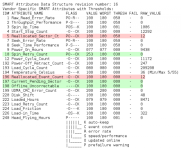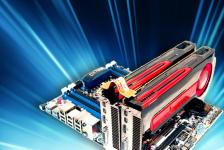Dell 14 Plus DB14255
HW: AMD Ryzen AI 5 340 w/ Radeon 840M, AMD graphics, memory module(s) 16GB, one drive (Phison Electronics Corporation Sabrent SB-2130-1TB), 14.0-inch display.
Kernel: 6.14.0-15-generic
PROBE ID
HW: AMD Ryzen AI 5 340 w/ Radeon 840M, AMD graphics, memory module(s) 16GB, one drive (Phison Electronics Corporation Sabrent SB-2130-1TB), 14.0-inch display.
Kernel: 6.14.0-15-generic
PROBE ID
Lenovo 3178 SDK0J40697 WIN 3305287329523 (V530S-07ICR 11BM002CMX)
HW: Intel Pentium Gold G5400 CPU, Intel graphics, one memory module (Micron 8ATF1G64AZ-2G3E1 8GB), one drive (Lite-On SATA CV8-8E256 256GB SSD).
Kernel: 6.1.0-35-amd64
PROBE ID
HW: Intel Pentium Gold G5400 CPU, Intel graphics, one memory module (Micron 8ATF1G64AZ-2G3E1 8GB), one drive (Lite-On SATA CV8-8E256 256GB SSD).
Kernel: 6.1.0-35-amd64
PROBE ID
EUROCOM RAPTOR X18
HW: Intel Core Ultra 9 275HX, Intel + Nvidia graphics, 4 memory modules (4 x Kingston KF556S40-32 32GB), 2 drives (2 x Samsung Electronics Co Ltd SSD 9100 PRO 2TB), 18.0-inch display and 60 more devices.
Kernel: 6.14.9-300.fc42.x86_64
PROBE ID
HW: Intel Core Ultra 9 275HX, Intel + Nvidia graphics, 4 memory modules (4 x Kingston KF556S40-32 32GB), 2 drives (2 x Samsung Electronics Co Ltd SSD 9100 PRO 2TB), 18.0-inch display and 60 more devices.
Kernel: 6.14.9-300.fc42.x86_64
PROBE ID
Shenzhen DOKE electronic MP200
HW: Intel 11th Gen Core i5-11400H, Intel graphics, memory module(s) 16GB, one drive (Shenzhen Longsys Electronics Co., Ltd. FORESEE XP1000F512G 512GB) and 40 more devices.
Kernel: 6.8.0-60-generic
PROBE ID
HW: Intel 11th Gen Core i5-11400H, Intel graphics, memory module(s) 16GB, one drive (Shenzhen Longsys Electronics Co., Ltd. FORESEE XP1000F512G 512GB) and 40 more devices.
Kernel: 6.8.0-60-generic
PROBE ID
Acer Aspire E1-432
HW: Intel Celeron 2955U, Intel graphics, one memory module (ADATA AM1L16BC2P1-B1FS 2GB), one drive (Seagate ST500LT012-9WS142 500GB), 14.0-inch display and 32 more devices.
Kernel: 6.12.30-amd64
PROBE ID
HW: Intel Celeron 2955U, Intel graphics, one memory module (ADATA AM1L16BC2P1-B1FS 2GB), one drive (Seagate ST500LT012-9WS142 500GB), 14.0-inch display and 32 more devices.
Kernel: 6.12.30-amd64
PROBE ID
Acer NC-V3-572PG-37HJ
HW: Intel Core i3-5005U CPU, Intel + Nvidia graphics, one memory module (Kingston ACR16D3LS1KNG/8G 8GB), one drive (China SATA3 480GB SSD), 15.5-inch display.
Kernel: 6.14.9-300.fc42.x86_64
PROBE ID
HW: Intel Core i3-5005U CPU, Intel + Nvidia graphics, one memory module (Kingston ACR16D3LS1KNG/8G 8GB), one drive (China SATA3 480GB SSD), 15.5-inch display.
Kernel: 6.14.9-300.fc42.x86_64
PROBE ID
Lenovo 3721 SDK0J40709 WIN 3259669561979 (IdeaCentre AIO 3 24IMB05 F0EU005VAU)
HW: Intel Core i5-10400T CPU, Intel graphics, 2 memory modules (2 x Samsung M471A5244CB0-CWE 4GB), 2 drives (Samsung Electronics Co Ltd MZALQ128HBHQ-000L1 128GB, WDC WD10SPZX-08Z10 1TB).
Kernel: 6.14.2-desktop-3omv2590
PROBE ID
HW: Intel Core i5-10400T CPU, Intel graphics, 2 memory modules (2 x Samsung M471A5244CB0-CWE 4GB), 2 drives (Samsung Electronics Co Ltd MZALQ128HBHQ-000L1 128GB, WDC WD10SPZX-08Z10 1TB).
Kernel: 6.14.2-desktop-3omv2590
PROBE ID
We've started to highlight most important SMART attributes in computer probes, that correlate with real mechanical failures according to Google and Backblaze studies.
Green highlights the zero value of important attributes, red — any positive value ...
Green highlights the zero value of important attributes, red — any positive value ...
A new project has been created to collect the list of computer hardware devices with poor Linux compatibility based on the Linux-Hardware.org data for 4 years.
There are about 26 thousands of depersonalized hwinfo reports in the repository from computers in various configurations (different kernels, OS — mostly ROSA Fresh). The device is included into the list of poorly supported devices if there is at least one user probe in which the driver for this device was not found. The column 'Missed' indicates the percentage of such probes. If number of such probes is small, it means that the driver was already added in newer versions of the OS. In this case we show minimal version of the Linux kernel in which the driver was present.
Devices are divided into categories. For each category we calculate the ratio of poorly supported devices to the total number of devices tested in this category.
At the moment, the study is limited only to PCI and USB devices. In the future, it is planned to include the rest.
Please check the presence of known unsupported devices in the table. The device ID can be taken from the output of the 'lspci -vvnn' command in square brackets, for example [1002:9851].
There are about 26 thousands of depersonalized hwinfo reports in the repository from computers in various configurations (different kernels, OS — mostly ROSA Fresh). The device is included into the list of poorly supported devices if there is at least one user probe in which the driver for this device was not found. The column 'Missed' indicates the percentage of such probes. If number of such probes is small, it means that the driver was already added in newer versions of the OS. In this case we show minimal version of the Linux kernel in which the driver was present.
Devices are divided into categories. For each category we calculate the ratio of poorly supported devices to the total number of devices tested in this category.
At the moment, the study is limited only to PCI and USB devices. In the future, it is planned to include the rest.
Please check the presence of known unsupported devices in the table. The device ID can be taken from the output of the 'lspci -vvnn' command in square brackets, for example [1002:9851].
A new open project has been created to estimate reliability of hard drives (HDD/SSD) in real-life conditions based on the SMART data collected in the Linux-Hardware.org database. The initial data (SMART reports), analysis methods and results are publicly shared in a new GitHub repository. Everyone can contribute to the report by uploading probes of their computers by the hw-probe tool!
The primary aim of the project is to find drives with longest "power on hours" and minimal number of errors. We use the following formula as a measure of reliability: Power_On_Hours / (1 + Number_Of_Errors), i.e. time to the first error/between errors.
Please be careful when reading the results table. Pay attention not only to the rating, but also to the number of checked model samples. If rating is low, then look at the number of power-on days and number of errors occurred. New drive models will appear at the end of the rating and will move to the top in the case of long error-free operation.
You can, as before, create a probe of your computer via the application in SimpleWelcome menu or from the console by a simple command:
hw-probe -all -upload
The primary aim of the project is to find drives with longest "power on hours" and minimal number of errors. We use the following formula as a measure of reliability: Power_On_Hours / (1 + Number_Of_Errors), i.e. time to the first error/between errors.
Please be careful when reading the results table. Pay attention not only to the rating, but also to the number of checked model samples. If rating is low, then look at the number of power-on days and number of errors occurred. New drive models will appear at the end of the rating and will move to the top in the case of long error-free operation.
You can, as before, create a probe of your computer via the application in SimpleWelcome menu or from the console by a simple command:
hw-probe -all -upload




